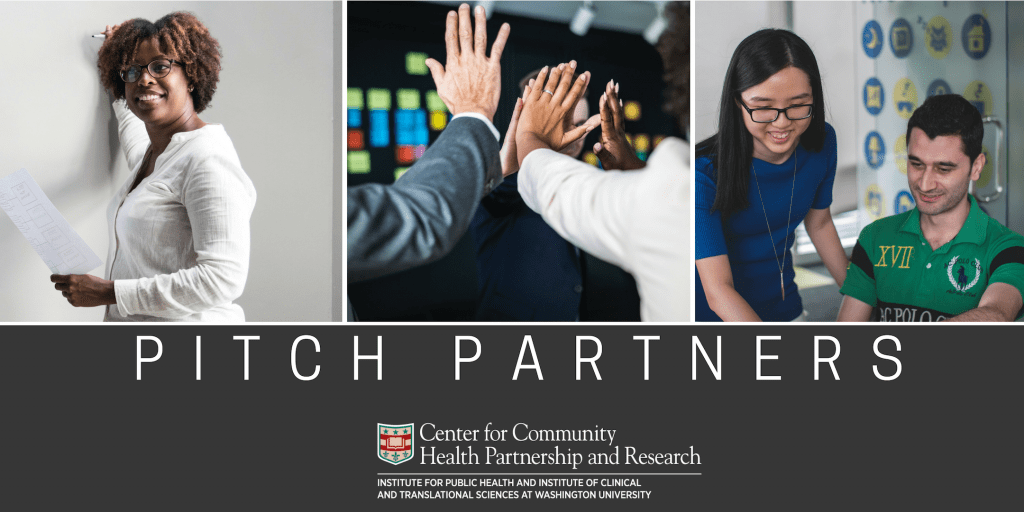Written by Kim Furlow, communications manager for the Institute for Public Health
The Center for Community Health Partnership and Research announces $10,000 in seed funding for each of three public health-related projects through its Pitch Partners² program.
The projects were originally “pitched” to a group of community members, organizations and faculty at a Pitch Partners meeting. There, attendees have the opportunity to present public health-related project ideas in order to identify potential partners and receive critical feedback. In addition to facilitating better communication between academia and the community regarding best practices, those in attendance learn about current Washington University community initiatives and research. The presented projects are evaluated and some are selected to receive seed funding.
The following projects were selected and recently awarded funding:
Expanding Access to Mental Health and Diabetes Care among African American Men
Team: Darrell Hudson PhD, MPH; Rose Jackson-Beavers, Program Manager, Bridges to Care and Recovery, Behavioral Health Network of Greater St. Louis
African American men are more likely to die from diabetes than any other racial/ethnic male group. Depression and type 2 diabetes frequently co-occur, and even more so among African Americans. Depression is associated with an unhealthy diet, physical inactivity and medication compliance, in addition to lower quality of life among patients. There are virtually no interventions developed specifically addressing depression among African American men with type 2 diabetes. This project will draw upon the expertise and experience of the research team and a community backbone mental health organization, the Behavioral Health Network (BHN), to develop a randomized clinical trial for at-home interventions designed specifically to meet the needs of this historically underserved population. Funding: Institute for Public Health
Sankofa Culture and Art Wellness Village Senior Summer Camp
Team: Christine Berg, PhD; Paulette Sankofa, Camp Director
These funds will support a summer camp, held for two, one week sessions for up to 70 people 50+ years of age in the Old North area of St. Louis. The camp focus is on participation in arts and cultural experiences to enhance health and well-being for residents. Desired outcomes include gauging the impact on participants’ health and wellness six months after camp attendance, and, to bring this 50+ community together at the end of camp to identify needs and to plan additional programs focused on health and wellness through the arts. Focus will be on using culturally relevant arts to engage seniors, build community and address health and well-being in zip codes where health inequities exist. We will use activity to engage a community to build trust and begin to address health. Funding: Institute for Clinical and Translational Sciences
A Community Collaboration Between Covenant Place and Washington University
Team: David Carr, MD; Joan Denison, CEO and President of Covenant Place
This project will create, maintain, and support a clinical database for the geriatric primary care clinic, Covenant Place, which will enable the clinic to cost-effectively run patient reports and extract key outcome metrics such as quality of life measurements and management of geriatric syndromes. The overall goal would be to reduce emergency room visits, hospitalizations and improve quality of life for patients. This effort of using the EMR to create new scripts and collate data can be used by other medical groups that care for frail older adults. Funding: Institute for Clinical and Translational Sciences
Funding for these projects is made possible by the Pitch Partners² funding mechanism from the Institute for Public Health and the Institute of Clinical and Translational Sciences through the Clinical and Translational Science Award (CTSA) Program of the National Center for Advancing Translational Sciences (NCATS) at the National Institutes of Health, Grant Number UL1 TR000448
